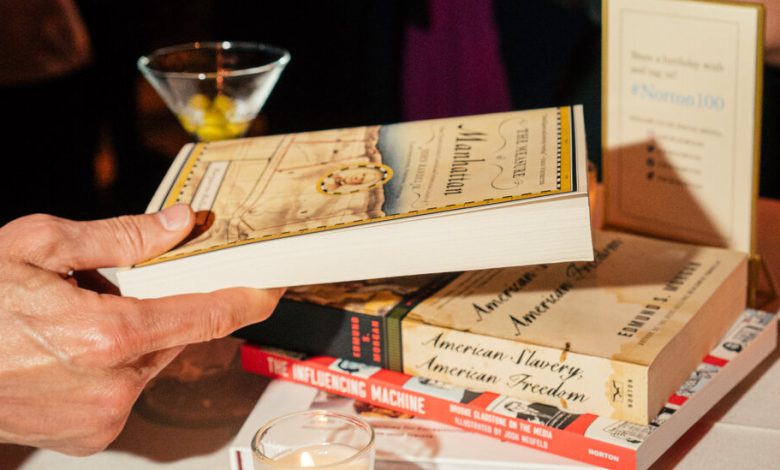Norton, a Defiant Indie Book Publisher, Celebrates 100 Years

As the tang of Canadian wildfire smoke wafted through Midtown Manhattan on Wednesday evening, hundreds of writers, editors and book industry veterans crowded into Cipriani’s cavernous ballroom on East 42nd Street to attend the centenary celebration of W.W. Norton & Company, the oldest and largest independently owned publishing house in the country.
Authors hung out by the bar sipping the evening’s signature cocktail, the Norton Cranthology, a mojito named after “The Norton Anthology of English Literature,” the doorstop compendium that has been a part of college curriculums since the 1960s.
The company’s sea gull colophon was projected onto walls. Tables were decorated with piles of classic Norton titles like “The Feminine Mystique” by Betty Friedan and “The Perfect Storm” by Sebastian Junger. Tote bags handed out to attendees came with a plushie of a baby gull named Norty.
To those in attendance, 100 years of Norton meant something, because there’s no other publishing house quite like it.
Co-founded in 1923 by William Warder Norton, the company began as a press for science and philosophy books. As it grew, it established itself with its canon-making anthologies, the novel “A Clockwork Orange” by Anthony Burgess and “Thirteen Days: A Memoir of the Cuban Missile Crisis” by Robert F. Kennedy.
Shortly after Mr. Norton’s death in 1945, his wife, Mary Dows Herter Norton, who was known as Polly and ran the company with him, entrusted it to its employees, creating the ethos of independence that defines Norton to this day.
While other legacy American houses have been swallowed up by European companies and corporate consolidation, Norton has occupied an increasingly defiant space in the industry as the only major publisher owned by its employees. The centenary bash at Cipriani was a celebration of the company’s refusal to capitulate.
To drive the message home, Norton asked five of its star authors to give speeches, and each was introduced onto the stage by the firm’s president, Julia Reidhead. First up was Michael Lewis, who has been a Norton author since the publication of his first book, “Liar’s Poker,” in 1989.
“Thirty-five years ago, I had the preposterous idea to write a book,” Mr. Lewis told the crowd. “I’d never set foot in a publishing house. I visited seven, eight, nine of these places. One of them was very much not like the others.”
The Norton offices, he added, resembled “your grandmother’s attic — after she died.”
He ended by praising the company for deciding not to go along with industry trends, saying: “I’m grateful for your ability to resist temptation. Everybody else has been led down various paths and you have not.”
In her speech, Joy Harjo, the United States poet laureate from 2019 to 2022, recalled receiving a rejection letter from Norton in the 1980s, before eventually forming a partnership with the company that has lasted 30 years.
Neil Gaiman commended Norton as a stable haven for its authors, before describing the overall publishing industry as a once “healthy ecosystem” that had been consumed by “vast crepuscular creatures, somewhere between jellyfish and giant squid.” Rita Dove read a poem from her 1999 collection, “On the Bus With Rosa Parks.” And Richard Powers described his arrival to Norton as a third marriage that finally worked out.
Mr. Powers, who lives in the Great Smoky Mountains region of Tennessee, had flown to New York for the party. “They’re able to engage with books without looking over their shoulder and thinking, What’s corporate going to think?” he said in an offstage interview as guests nearby feasted on lobster salad and fusilli served with eggplant and mozzarella. “As a self-owned entity, Norton is essentially good old-fashioned 19th-century socialism.”
“When I told my editor I had a 560-page novel about trees, he didn’t bat an eye,” he added, referring to his Pulitzer Prize-winning work, “The Overstory.”
Amid the swinging jazz sounds of Vince Giordano and the Nighthawks, Lake Micah, an editor who works for Harper’s Magazine and The Drift, nursed a whiskey sour.
“Now everyone’s about the bottom line, but Norton has persisted in spite of that,” he said. “And that’s because of the great faculty of worker-owned labor power, which is something that emanates from the left.”
He expressed some skepticism about the big bash.
“I mean, we’re here at Cipriani, so you can only imagine how much this all cost,” Mr. Micah said. “They’re still a business. They’re arguably doing the bare minimum in terms of what’s right, because all workers should deserve what’s fair.”
As the night drew to a close and publishing people mobbed the open bar for one last round, Alexia Norton Jones sat on a couch taking in the scene. Her presence represented a living link to the company’s heritage: She is a granddaughter of its founders.
“Some people here don’t even know who I am, but I don’t mind,” she said. “When Grandma Polly died, she didn’t want a dynasty. She didn’t want the company to have a nepotistic aspect. I’m a granddaughter of Norton, but they’re also all Norton.”
Ms. Norton Jones took a pen and drew a sea gull on a cocktail napkin, explaining that the logo was based on the pair of W’s in her grandfather’s signature. She also recalled visiting her grandmother at the Gramercy Park Hotel, where she’d watch her write in her diaries with green ink.
An early Norton president, George P. Brockway, once said that the house“has never been for sale and is not likely to be.” When asked whether that was still the case decades later, Ms. Norton Jones didn’t hesitate in her reply.
“I don’t believe it will ever be for sale,” she said. “That would be the antithesis of everything Norton stands for.”





